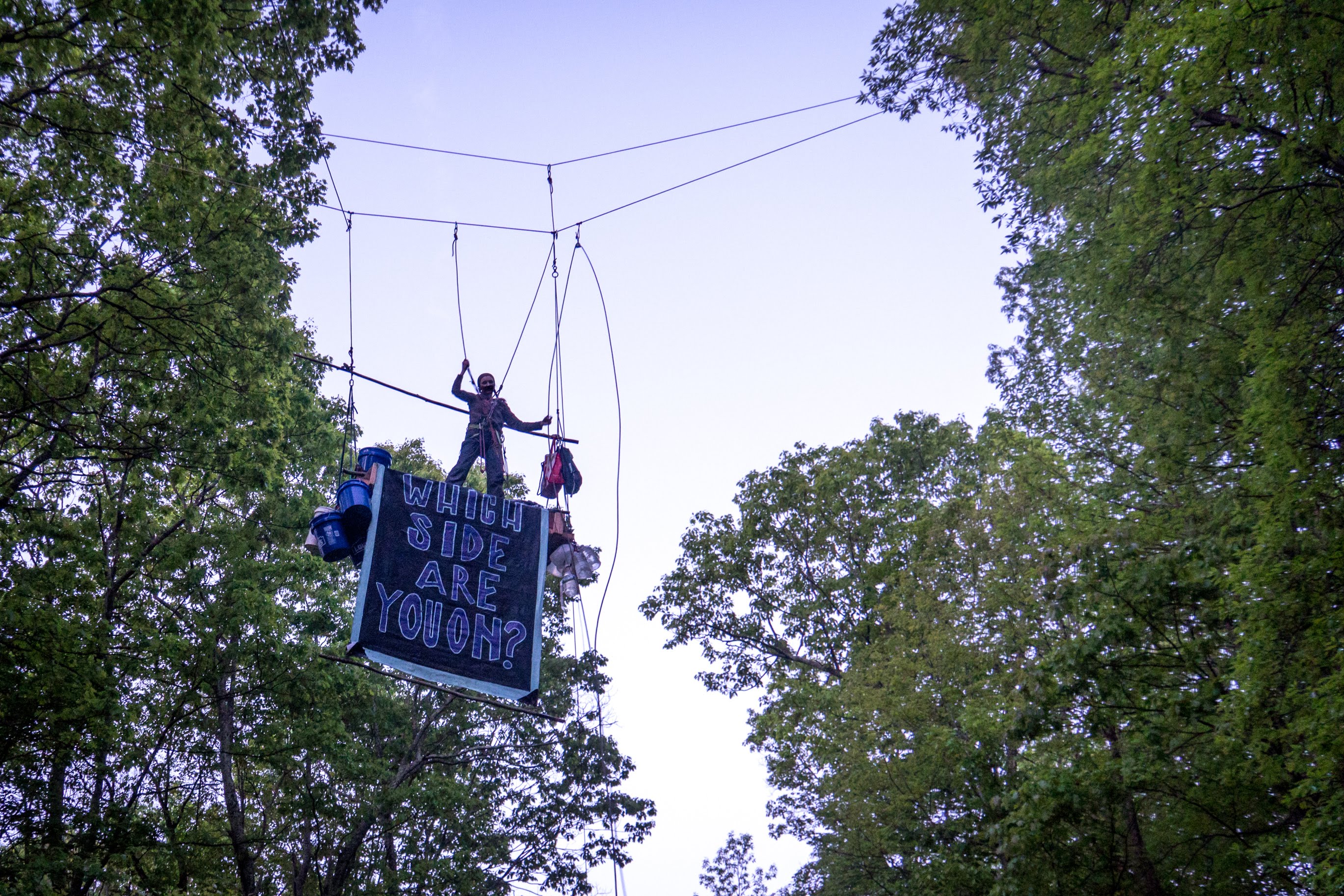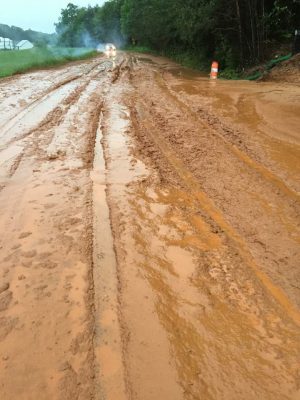Kevin Ridder | June 7, 2018 | No Comments
By Kevin Ridder
“If we rely on one location, one tactic or one group of people to stop this pipeline, we will fail. But we’re not,” she wrote in a May 23 post on the Appalachians Against Pipelines Facebook page. “I know that as this one facet of the struggle draws to conclusion, more people in other places are gaining momentum.”
“Nutty.” “Ink.” “Deckard.” Theresa “Red” and Theresa Minor Terry. Fern MacDougal. These are only six of at least 10 individuals who have taken to the trees at various points along the Mountain Valley Pipeline’s route since February. On June 1, MacDougal was forcibly evicted from her tree-stand by law enforcement and charged with four misdemeanors after a 12-day tree-sit, according to Appalachians Against Pipelines. Shortly after, law enforcement prepared to extract Deckard — the last remaining person at the first tree-sit. Deckard descended willingly after 95 days and was arrested.
On June 4, three people identified as Max, Lex and Syd blocked construction of the Mountain Valley Pipeline for four hours near U.S. Route 219 by locking themselves to construction equipment, according to Appalachians Against Pipelines. All three were arrested and charged with three misdemeanors each, and were released from jail after a bail amount of $1,500 was posted.

Max, Lex and Syd, the protestors who locked themselves to MVP construction equipment. Photo courtesy of Appalachians Against Pipelines
Atlantic Coast Pipeline opponents continue to occupy Three Sisters Resistance Camp in the pipeline’s path in Buckingham County, Va. And in Huntingdon County, Pa., Ellen Gerhart, her daughter Elise and supporters are still resisting the Mariner East 2 Pipeline on their property. They hosted a tree-sit until April 8, when the company cut down the trees, which were temporarily vacated. Ellen Gerhart faces up to six months in jail without trial and possible restitution to the company for her role in the protest.
Community and environmental groups including nonprofit organization Appalachian Voices, the publisher of this newspaper, have filed numerous legal challenges against the fracked gas pipelines. In March, the Federal Energy Regulatory Commission denied environmental groups’ request to suspend construction on the Mountaineer XPress Pipeline. The companies behind the Mountaineer XPress, NEXUS and Rover pipelines state they expect to begin service in 2018. The company behind the Atlantic Sunrise pipeline, which began operating in September, states full service is expected in mid-2018. And while construction has been stalled at points along the Mountain Valley, Atlantic Coast and Mariner East 2 pipelines, it has not been stopped.
Dominion Energy broke ground on the 600-mile Atlantic Coast Pipeline in West Virginia in May. However, construction will have to wait until the fall in other areas due to a tree-clearing deadline intended to protect migratory birds and bats.
FERC extended Mountain Valley developers’ tree-felling deadline in parts of the Jefferson National Forest to May 31, where tree-sitters have blocked clearcutting in some areas.
Mountain Valley Pipeline developers unveiled plans in April to extend the 303-mile fracked gas pipeline by an additional 70 miles into Rockingham and Alamance counties in North Carolina. The exact route of the expanded pipeline, called MVP Southgate, is yet to be determined, but it would begin at a proposed compressor station in Pittsylvania County, Va., and end near Graham, N.C., after crossing Interstate 40.
The private companies behind Mountain Valley Pipeline, LLC, expect the $350 million project to be operational by late 2020, contingent on approval from the Federal Energy Regulatory Commission and the states of North Carolina and Virginia. Opponents of the project like nonprofit citizens’ group Haw River Assembly dispute MVP Southgate’s argument that the expansion is a public necessity, and assert on their website that Duke Energy and Dominion Energy “will buy and sell to each other to show a consumer need.”
Duke Energy owns Piedmont Natural Gas, which owns the gas that will flow through the pipeline. Mountain Valley, LLC, stated that MVP Southgate is “anchored by a firm capacity commitment from PSNC Energy,” a subsidiary of SCANA Corporation, which is a Dominion Energy subsidiary.
According to nonprofit news outlet NC Policy Watch, a land agency contracting with MVP Southgate has been pressuring people along the MVP Southgate’s potential route into signing pipeline easements. In one case, an agent reportedly called landowners in the pipeline’s proposed path and told them, “This is for the people. … North Carolina is for it and has deemed it necessary,” despite the fact that MVP Southgate had not filed for state permits at that time.
A few days before Nutty descended from her monopod, Fern MacDougal took up camp about a mile down the same access road suspended high above the ground. “Which side are you on?” read a banner hanging from her platform, quoting the regional labor song by Florence Reece.

Tree-sitter Fern MacDougal said her banner was “largely directed” at the U.S. Forest Service. Photo courtesy of Appalachians Against Pipelines
When three supporters attempted to cross the boundary to resupply Nutty, according to Outside Magazine, agency officials reportedly ordered them to the ground before putting one in handcuffs and leg shackles and arresting all three.
In a press release, the Forest Service stated the closure “was enacted to protect public safety due to hazards associated with constructing the Mountain Valley Pipeline.”
The agency has also come under fire for allowing Forest Service officials and Mountain Valley security to drive ATVs on the Appalachian Trail, where motor vehicles are typically prohibited.
At the Little Teel Crossing tree-sit in Franklin County, Va., the protester known as “Ink” was injured on May 25 when Mountain Valley workers cut into trees Ink was clipped to. According to the Little Teel Crossing Facebook page, which posts updates from the tree-sitters, security crews and U.S. marshals told the workers to keep cutting even when told that Ink would be hurt.
Facing contempt charges, Ink descended the tree-sit on May 28 after 38 days. A tree-sitter named “Sprout” took up camp adjacent to Ink’s former position that same day but was forced to come down hours later when U.S. marshals delivered a notice of contempt and an order to appear in court later that day, according to the tree-sit’s Facebook page.
Neither Ink nor Sprout made an appearance at court on May 28. At the hearing, Judge Elizabeth Dillon said the tree-sitters “should know court proceedings are not a game.”
The Little Teel Crossing Facebook page rebuked Dillon’s words in a post. “They said this is not a game yet they continue to change the rules so they can win. The brutalization of our earth and our people is not something we can respect or abide by. So we echo Judge Dillon’s statements. This Is Not A Game.”
On May 31, two people were arrested at Little Teel Crossing even though they were outside Mountain Valley’s established construction boundary, according to the group’s Facebook page. Little Teel Crossing landowners Carolyn and Ian Reilly have been fined $1,000 each for allegedly supporting the tree-sit.
Along the Mountain Valley Pipeline’s path in Roanoke County, Va., Theresa “Red” Terry and her daughter Theresa Minor Terry staged a 34-day tree-sit on their property, which has been in their family for seven generations. They descended on May 5, after a judge told them they faced forced removal by U.S. marshals as well as a $1,000 fine to be paid to Mountain Valley for every day they remained past that day. Red’s husband, Coles Terry, III, was fined $2,000, and the Terrys face trespassing charges as well as the possibility of paying tens of thousands of dollars in fines for delays to the project and the 24/7 police presence, according to WFIR Radio.
“I find that funny that I was on my land, and they’re charging me with trespassing … We didn’t ask for a police presence, MVP did,” Red told WFIR Radio on May 11. “We didn’t ask them to try to starve us down, MVP did.”
Although Roanoke County police prevented the Terrys’ supporters from supplying them with food and water for two weeks, rations were provided after an article ran in The Washington Post, according to the publication.
“I don’t know what the tipping point would be or what critical mass it would require [to stop the pipeline], but it’s not going to happen by people not doing anything,” Deckard from the Peters Mountain tree-sit in West Virginia told The Independent on May 5.
In mid-May, a federal court cancelled a key permit for the Atlantic Coast Pipeline involving the project’s impact on endangered species. Dominion stopped construction along 100 miles of the pipeline’s route in Virginia and West Virginia until the U.S. Fish and Wildlife Service issues a revised permit. According to The Exponent Telegram, Dominion stated construction in other areas will move forward as planned.
As of press time on May 31, the Pennsylvania Department of Environmental Protection had issued the Mariner East 2 Pipeline 54 notices of violation. On May 24, StateImpact Pennsylvania reported that a state judge shut down construction in the Philadelphia suburbs on Mariner East 2 and Mariner East 2X as well as the operation of Mariner East 1, citing an “imminent risk to the public.” Mariner East operator Sunoco has appealed the decision and plans to continue constructing the pipelines elsewhere along their route.
Nonprofit citizen group Bold Alliance is challenging the Federal Energy Regulatory Commission’s notices to proceed with construction of the Mountain Valley Pipeline. In May, FERC denied a rehearing of the notices, and Bold Alliance asked a federal court for both a rehearing and a stay on the pipeline’s construction.
On May 23, the Army Corps of Engineers indefinitely suspended portions of a 404 Clean Water Act permit needed for construction of the Mountain Valley Pipeline after a coalition of environmental groups, including Appalachian Voices, asked the agency to stay the full permit for further review.
The partial suspension applies to crossings of the Gauley, Greenbrier, Elk and Meadow rivers, which Mountain Valley’s records show would not be able to be completed within the required 72-hour limit. Under the general nationwide permit used by the Army Corps, if even one of the water crossings can not be completed in 72 hours, the entire permit is supposed to be invalidated.
“This admission by the corps provides further evidence that blanket permits cannot protect water quality from large pipeline projects like the Mountain Valley Pipeline,” said Appalachian Voices’ Virginia Program Manager Peter Anderson.
The corps did not commit to waiting for a court ruling before reinstating the permit, according to nonprofit law center Appalachian Mountain Advocates, which filed the stay request. The center has filed a federal motion seeking a full suspension of the permit.

After several days of heavy rain in Franklin County, Va., erosion controls at a Mountain Valley Pipeline construction site failed and caused a mudslide, blocking this road. Photo by Dylan Guilliams
Citizens monitoring water quality with the Mountain Valley Watch network reported the mud-covered road. According to WVTF public radio, citizens had reported at least 15 erosion control violations as of May 25. In Southwest Virginia resident Linda Sink’s case, WVTF reports a spring near her water supply may have been breached. Sink told the station that the spring, which is roughly 3 tenths of a mile from the Mountain Valley Pipeline, “never runs muddy and it was running blood red, muddy.”
In an April 30 Washington Post op-ed, Appalachian Voices Executive Director Tom Cormons and former Virginia Congressman Tom Perriello called on Virginia Gov. Ralph Northam’s administration to halt the projects and conduct a further review of water impacts.
In the op-ed, Cormons and Perriello underscored the governor’s power to ensure Virginia waterways are protected instead of deferring to the Trump Administration’s nationwide permit. “During his election campaign, Northam wrote the DEQ requesting that it do its own analysis of water impacts, not rely on the federal permit,” the op-ed reads. “Now he is in charge and can make this happen with a phone call to his DEQ director.”
Roanoke County resident Jacki Lucki’s land near the path of the Mountain Valley Pipeline was highlighted in a May report by environmental consulting firm Downstream Strategies showing that both the Atlantic Coast and Mountain Valley pipelines threaten Virginia’s groundwater supplies.
“I live amid a mountain sanctuary that has been lovingly protected for generations and is now threatened by this pipeline project,” said Lucki in a Natural Resources Defense Council press release. “The governor and state agencies should put a halt to it, so we can continue to enjoy safe drinking water.”
For updates, visit appvoices.org/blog. For info about water monitoring, visit appvoices.org/pipeline-monitoring
Editor’s Note: This article was updated on June 6, 2018, to provide new information on pipeline resistance.
Like this content? Subscribe to The Voice email digests